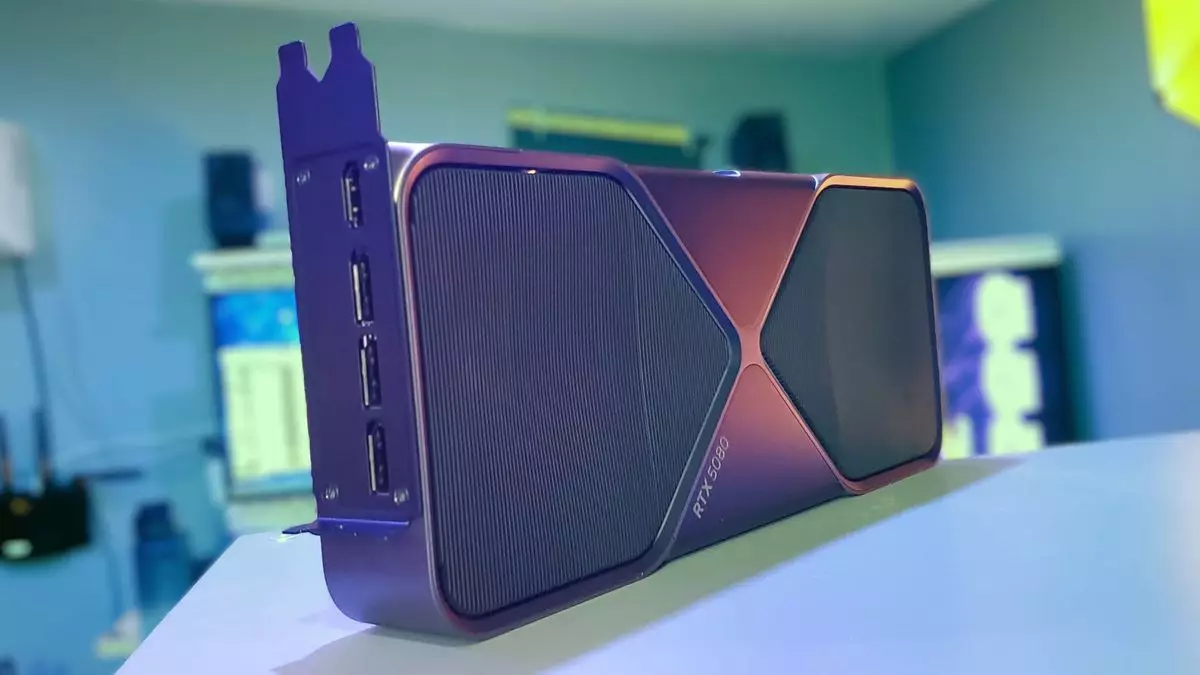The recent launch of Nvidia’s RTX 50-series graphics cards has elicited a spectrum of reactions from gamers and hardware enthusiasts alike. Marketed as cutting-edge technology, these new offerings received titles ranging from “the most powerful graphics core for gaming” to more reserved and critical descriptors, such as “strangely unexciting” and “a paper launch.” This ambivalence sets the stage for a vibrant discussion regarding their performance, availability, and overall impact on the gaming community.
Despite the mixed reception, one undeniable aspect of the RTX 50-series launch was the overwhelming demand. Newegg reported that its allotment of these cards sold out at an astonishing pace, with the majority of inventory disappearing within a mere five minutes. While the total duration for complete sellout was twenty minutes, it is clear that consumer interest was not just significant—it was insatiable. This rapid sellout phase raises questions about stock levels compared to previous launches; however, the exact figures remain undisclosed, leaving a veil of uncertainty about how these sales metrics truly stack up against past performance.
The sheer volume of traffic on Newegg’s platform surged to ten times its usual levels around the launch, which is a testament to the high consumer interest in RTX 50-series products. This surge suggests that while critics may question the innovative nature of the cards, the broader market exhibits a distinct enthusiasm for Nvidia’s latest proposition. Interestingly, the RTX 5080 emerged as the most sought-after model among the new releases. Given its relatively lower price point and broader appeal, it is not unexpected that gamers gravitate towards it in droves.
The duality of excitement and critique encapsulates the current gaming landscape in relation to these graphics cards. On the one hand, analysts and gamers alike applaud Nvidia’s technical advancements and the promise of improved performance. On the other hand, a palpable sense of disappointment lingers in the air. Some commentators argue that while the RTX 50-series is undoubtedly powerful, it lacks the ground-breaking innovation that fans anticipated. This dichotomy could be indicative of a larger trend in the tech industry: consumers are beginning to demand not only performance but also a tangible evolution of technology that alters the gaming experience in fundamental ways.
As Newegg’s VP of Product Management, Jim Tseng, noted regarding consumer sentiment: “The overwhelming demand reaffirms the gaming and PC community’s enthusiasm for the very best technology.” While this statement reflects a positive outlook from the retailer’s perspective, it simultaneously highlights a potential disconnect between what the company sees as revolutionary and what consumers expect. As the industry matures, the challenge lies in pushing the boundaries of innovation while catering to a discerning audience that is quick to critique perceived stagnation.
With such high demand from consumers, the pressing question remains: when will restocks occur? Newegg has indicated that follow-up inventory releases are possible, with reports emerging of additional RTX 5080 stock arriving merely hours after the initial launch. For consumers frustrated by their inability to secure a card, the best approach may be to stay vigilant and monitor social media channels of major retailers to seize restock updates as they become available.
The urgency exhibits a wider cultural obsession within the gaming community, reflecting the impact that graphics technology has on gameplay and user experience. Gamers, eager to maximize their performance and enhance their systems, are likely to remain engaged and alert to the latest information as it drops.
The velvety thrill of Nvidia’s RTX 50-series launch has not dampened the excitement that gaming enthusiasts harbor for cutting-edge technology. While the initial feedback suggests a balanced view of awe and criticism, the demand metrics speak volumes about the community’s inclination towards high-performance GPUs. As restocks and new offerings emerge, Nvidia will have an opportunity to regain the spotlight and possibly address the critique surrounding innovation within its product line. For now, the RTX 50-series stands as a reflection of a rapidly transforming gaming landscape, where high expectations meet the ever-evolving nature of technology.

